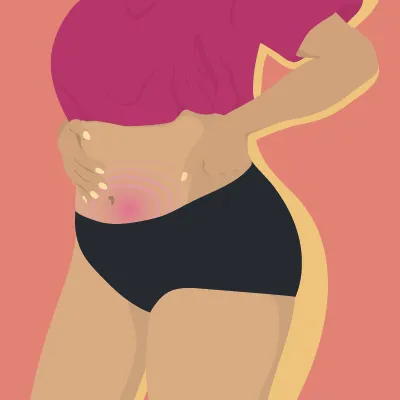Jun 12, 2025
What to Expect During Your First Period After Birth
You’ve made it through the whirlwind of birth, sleepless nights, and learning how to care for a tiny human, so when your body decides it’s time for a period again, it can catch you off guard. Whether you’re breastfeeding or bottle-feeding, whether your baby is a few weeks or several months old, your first postpartum period can be a whole experience.
Let’s walk through what to expect, what’s normal, and what might surprise you - no stress, no shame, just the facts.
First, a Quick Note on Postpartum Bleeding
Before your actual period returns, there’s postpartum bleeding, also known as lochia. This isn’t your period, it’s your body’s way of shedding everything it built up during pregnancy, like extra blood, mucus, and tissue. It usually lasts around 4–6 weeks, sometimes a little longer, and gradually changes from bright red to pink, brown, or even yellowish white.
It might feel like a super intense period at first, but lochia is a separate phase and it doesn’t mean your cycle has restarted just yet.
So, When Does the First Period Come Back?
Here’s the thing: there’s no “one size fits all.” Your body’s timeline is unique, and a lot depends on your hormone levels and whether you’re breastfeeding.
- If you're not breastfeeding, your first period could return anywhere between 6 to 12 weeks after birth.
- If you're exclusively breastfeeding, it might not come back for months, or not until you stop or reduce feeding. That’s because prolactin (the hormone that helps you produce milk) can suppress ovulation.
And yes, it’s possible to ovulate before your period even returns. So, if you’re not planning on getting pregnant again soon, talk to your doctor about contraception options.
What Will That First Period Be Like?
Short answer: It might be completely different than what you remember from pre-pregnancy life.
Here’s what you might notice:
- Heavier or lighter flow: Some people experience a heavy period (hello, pads and backups), while others find their flow is lighter. It could also be a mix of both.
- More intense cramps or none at all: If your cramps used to knock you out before, they might now feel milder. Or vice versa. Everyone’s uterus heals and adjusts differently.
- Clotting: Seeing small clots can be normal, especially during a heavier flow, but anything larger than a coin should be checked with a healthcare provider.
- Mood swings and PMS: Hormones are still settling, so don’t be surprised if you feel a little extra emotional. Your body’s still recalibrating.
What’s the Difference Between Postpartum Bleeding and a Real Period?
It can be confusing, especially if your bleeding seems to stop and start again. The key difference? Timing and ovulation. Postpartum bleeding begins right after delivery and isn’t related to your cycle. But if you experience bleeding weeks or months later, especially with PMS-like symptoms, it’s likely your cycle has officially resumed.
Is It Going to Be Irregular?
Yep, at least for a while. Many people notice their cycles take time to regulate after birth. You might go a month without a period, then have two in a row. Hormones, stress, and sleep deprivation (hello, newborn life) all play a part in this.
Don’t worry too much about inconsistency unless the bleeding is very heavy, you’re in pain, or your period hasn’t returned for several months despite not breastfeeding. That’s always a good time to check in with your doctor.
How to Handle Your First Period Post-Baby
- Stock up on supplies: You might need heavier flow products than you used before. Many people find comfort in high-absorbency pads or period underwear during this time.
- Stay hydrated and nourished: Your body is still recovering, and blood loss can leave you feeling depleted. Drink water, eat nourishing meals, and rest when you can (easier said than done, we know).
- Listen to your body: Fatigue, cramps, mood shifts, it’s a lot. Take it slow, and don’t be afraid to ask for help.
- Talk about it: Whether it’s with your doctor, your partner, or a friend who’s been there talking through what you’re experiencing can make it feel less overwhelming.
When to Call Your Doctor
While most changes are totally normal, there are a few red flags worth watching out for:
- Bleeding through a pad in an hour or less, for several hours
- Clots larger than a 50-cent coin
- Dizziness, faintness, or shortness of breath
- Sharp pelvic pain or a fever
If anything feels off, trust your gut. It’s better to ask and be told it’s fine than to ignore something important.
Final Thoughts
Getting your first postpartum period can be a strange combo of “Ugh, again?” and “Okay, my body’s finding its rhythm again.” Whether it comes back in six weeks or six months, just know that every body is different - and there’s no right timeline.
Having a baby doesn’t just change your life, it also changes how your body works, recovers, and responds. Be patient with yourself. You’ve been through a lot, and you’re doing better than you think.
Love, Libra x
Essity makes no warranties or representations regarding the completeness or accuracy of the information. This information should be used only as a guide and should not be relied upon as a substitute for professional, medical or other health professional advice.







